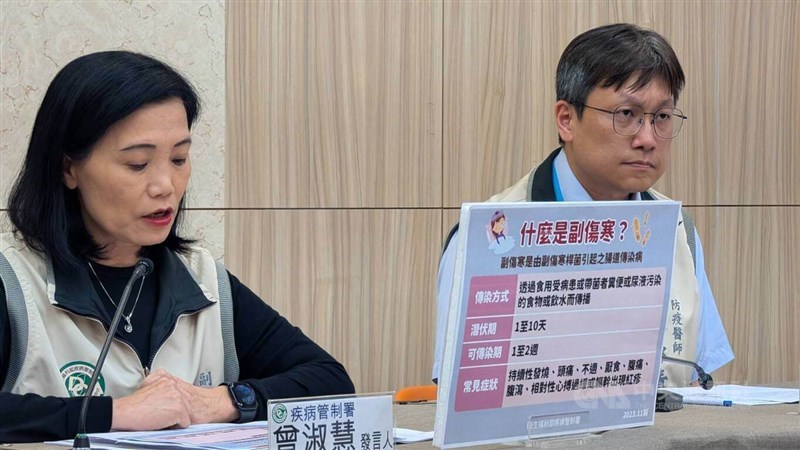
Taipei, Sept. 23 (CNA) Taiwan has reported its first local paratyphoid fever case of the year, involving a man in his 20s of foreign nationality who developed fever, diarrhea and headaches in late August, the Centers for Disease Control (CDC) said Tuesday.
The man arrived from India in early August and lived in central Taiwan. He fell ill on Aug. 26 and was hospitalized on Sept. 1, where blood tests confirmed Salmonella Paratyphi.
After two weeks of antibiotic treatment, the patient was discharged in mid-September, CDC physician Lin Yung-ching (林詠青) said at a routine news briefing in Taipei.
Lin said the patient spent his entire incubation period in Taiwan, so the case was classified as locally transmitted. Three of the man's household contacts tested negative and remain asymptomatic.
The source of infection is under investigation, though the patient reported no consumption of untreated water, raw food, or seafood, she added.
As of Sept. 22, Taiwan had logged one paratyphoid case this year, CDC Epidemic Intelligence Center Director Kuo Hung-wei (郭宏偉) said at the briefing.
Between 2021 and 2025, Taiwan reported one, six, 26, three, and one local case, respectively, along with a few imported cases from Indonesia, India and Cambodia, Kuo added, citing CDC data.
CDC spokesperson Tseng Shu-hui (曾淑慧) explained that paratyphoid fever is an intestinal infectious disease caused by Salmonella Paratyphi, transmitted mainly through food or water contaminated with the feces or urine of infected individuals.
She urged the public to maintain good hygiene, boil drinking water or use bottled water, cook food thoroughly, avoid cross-contamination and wash hands properly to reduce infection risk.
- Politics
U.S. to deter China through strength, not confrontation: Pete Hegseth
12/07/2025 01:29 PM - Society
Taiwan headline news
12/07/2025 12:36 PM - Society
Chilly 10.7°C recorded in Hsinchu County Sunday morning
12/07/2025 10:44 AM - Politics
Taiwan hoping to release list of Indigenous political victims soon
12/06/2025 10:30 PM - Society
Taiwan to continue universal hepatitis B vaccination for newborns
12/06/2025 08:48 PM